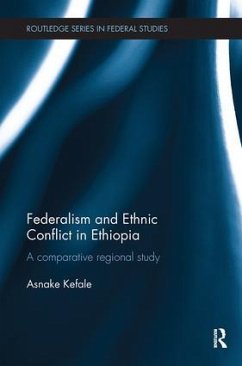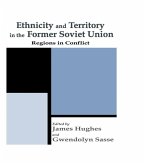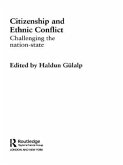This book examines the impact of the federal restructuring of Ethiopia on ethnic conflicts.
The adoption of ethnic federalism in Ethiopia was closely related with the problem of creating a state structure that could be used as instrument of managing the complex ethno-linguistic diversity of the country. Ethiopia is a multinational country with about 85 ethno-linguistic groups and since the 1960s, it suffered from ethno-regional conflicts. The book considers multiple governance and state factors that could explain the difficulties Ethiopian federalism faces to realise its objectives. These include lack of political pluralism and the use of ethnicity as the sole instrument of state organisation.
Federalism and Ethnic Conflict in Ethiopia will be of interest to students and scholars of federal studies, ethnic conflict and regionalism.
The adoption of ethnic federalism in Ethiopia was closely related with the problem of creating a state structure that could be used as instrument of managing the complex ethno-linguistic diversity of the country. Ethiopia is a multinational country with about 85 ethno-linguistic groups and since the 1960s, it suffered from ethno-regional conflicts. The book considers multiple governance and state factors that could explain the difficulties Ethiopian federalism faces to realise its objectives. These include lack of political pluralism and the use of ethnicity as the sole instrument of state organisation.
Federalism and Ethnic Conflict in Ethiopia will be of interest to students and scholars of federal studies, ethnic conflict and regionalism.
"Asnake Kefale's account on federalism and ethnic conflict in Ethiopia is valuable and highly recommendable for interested readers. By structuring conflicts into various categories and comparing two very distinct regions as the Somali and Benishangul-Gumuz, the author has reached his goal to increase the debate over the shape of federalism in Ethiopia. The main contribution of this book lies in the fact that the issue of federalism is still very acute and 'tangible' in Ethiopia, especially with its so repeatedly criticized 'ethnic' variety. Asnake Kefale's valuable insight, which was based on field work in both discussed regions, shows that federalism - when it is not taken in an appropriate form and when its functioning is not well developed and managed--can cause serious troubles. As some of the issues are not "invented by federalism itself and they have longer historical roots, the book, thus, should be recommended to all who are interested in federalism, problems of federalism, modern history and politics of Ethiopia, conflicts and political systems in Africa, or simply modern and contemporary history of Ethiopia." - Jan Záhorík, Ethiopian Journal of Social Sciences and Language Studies
"Asnake Kefale's account on federalism and ethnic conflict in Ethiopia is valuable and highly recommendable for interested readers. By structuring conflicts into various categories and comparing two very distinct regions as the Somali and Benishangul-Gumuz, the author has reached his goal to increase the debate over the shape of federalism in Ethiopia. The main contribution of this book lies in the fact that the issue of federalism is still very acute and 'tangible' in Ethiopia, especially with its so repeatedly criticized 'ethnic' variety. Asnake Kefale's valuable insight, which was based on field work in both discussed regions, shows that federalism - when it is not taken in an appropriate form and when its functioning is not well developed and managed--can cause serious troubles. As some of the issues are not "invented by federalism itself and they have longer historical roots, the book, thus, should be recommended to all who are interested in federalism, problems of federalism, modern history and politics of Ethiopia, conflicts and political systems in Africa, or simply modern and contemporary history of Ethiopia." - Jan Záhorík, Ethiopian Journal of Social Sciences and Language Studies









